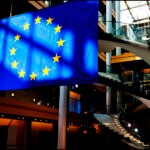European Union faces new challenges after a pivotal year
During 2017, the European Union managed to weather populist electoral bids in its member countries, and to keep the Brexit talks on track. But the year to come presents even larger challenges that will require a sustained, collective effort by EU leaders, says BBVA Executive Director José Manuel González-Páramo.

The year 2017 has turned out to be a crucial one for Europe. The continent has managed to overcome some significant uncertainties, both political and economic: euro-skepticism and populism were contained at the ballot box in several elections and an agreement in principle was reached on the first phase of the Brexit negotiations.
Although these developments bode for a relatively calm 2018, the countries of the European Union need to work together to face the challenges that lie ahead, warned José Manuel González-Páramo, BBVA’s executive director and head of economy, regulation and institutional relations.
Speaking at the Rome Investment Forum, a financial event hosted by the Italian Banking Federation in Rome, González-Paramo said improving communication between EU institutions and citizens should be a priority on the policy agenda of European leaders.
“To preserve and promote this historically successful project, the countries of the Union must tackle the current challenges with a collective effort to restore public confidence and reduce the gap between citizens and the institutions of the European Union,” Gonzaléz-Páramo said.
The BBVA executive warned that, in spite of a more optimistic economic outlook —BBVA Research's forecasts for European GDP point to a growth of 2.2 % in 2017 and 1.8% in 2018— Europe cannot afford to rest on its laurels.

José Manuel González-Páramo, BBVA’s executive director and head of economy, regulation and institutional relations during his speech at the Rome Investment Forum - FeBAF
Institutional and socio-economic challenges, priorities for the EU
In his opinion, Europe still faces significant challenges in the socio-economic area that need to be addressed fast to avoid populist drifts. In this regard, he considers it fundamental to bring European institutions closer to citizens. To this end, he proposed a strategy of leadership, transparency and equality among EU countries, to close the social gap between member states.
González-Páramo also stressed that European authorities must tackle institutional challenges, such as completing the banking and the Capital Markets unions and moving towards a fiscal union. Other challenges he pointed to are security and border control, the management of the refugee crisis and cybercrime. Lastly, he said Europe needs to squarely face the issues of environment and climate change.
How should the EU address these institutional challenges?
José Manuel González-Páramo believes that Europe needs to work on concrete initiatives. He cited the proposals recently launched by the European Commission for deepening Europe’s economic and monetary union, such as creating the European Minister of Economy and Finance. Another possibility for moving forward in integration would be working with an EU "at two or more speeds.”
Despite the difficulties, the integration of Europe has brought a degree of peace and stability unimaginable only a generation ago. In addition, membership in the European Union has led to an increase in the standard of living in all its nations.